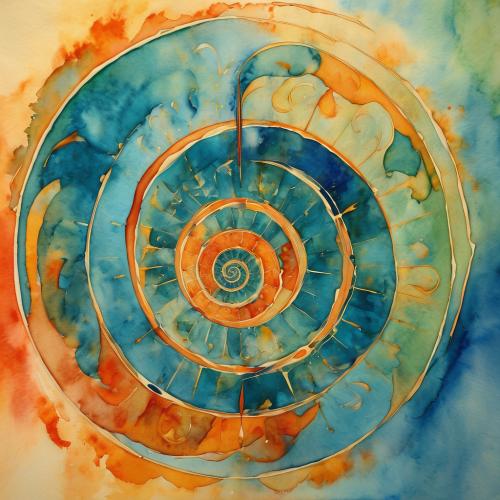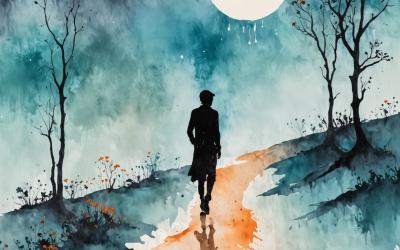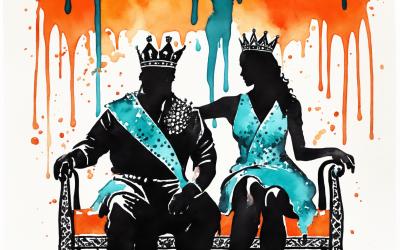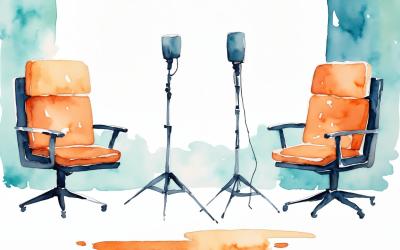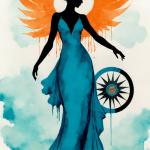Explore the structure of the Tarot deck, from the profound Major Arcana to the nuanced Minor Arcana, and learn how these cards mirror life's grand themes and daily experiences.
Imagine holding a deck of tarot cards for the first time - perhaps this actually describes the current point in your tarot journey. Feel their weight in your hands, the texture of the cards against your fingers. In this moment, you're touching a tool that has guided seekers for centuries. Let's explore this ancient wisdom together, with open hearts and curious minds.
The Tarot Deck: A Mirror of Life
A tarot deck is like a book of life, containing 78 pages of insight. Each card is a portal to understanding, reflecting different aspects of our human experience. As we explore its structure, remember: the tarot is not about predicting a fixed future, but about illuminating the present moment and the potential it holds.
The 78 cards of a tarot deck are divided into two main categories: the Major Arcana and the Minor Arcana. The Major Arcana consists of 22 cards, each representing significant life themes and archetypal experiences. The Minor Arcana comprises the remaining 56 cards, divided into four suits of 14 cards each: Wands, Cups, Swords, and Pentacles. These suits represent different aspects of daily life and human experience.
This structure allows the tarot to address both the profound, transformative moments in our lives and the day-to-day experiences that shape our journey. Let's explore each of these sections in more detail, starting with the Major Arcana.
Major Arcana: The Soul's Journey
Within the deck, we find 22 Major Arcana cards. These are the big themes of life, the archetypal experiences we all encounter on our path to self-realization. When a Major Arcana card appears in a reading, it's as if the universe is gently tapping us on the shoulder, inviting us to pay close attention.
The Fool's Journey, represented by these cards, is a metaphor for our own spiritual evolution. It begins with The Fool (0), symbolizing innocent beginnings, open-minded curiosity, and the start of a new adventure. As we progress through the cards, we encounter various archetypes and experiences:
- The Magician (I) and The High Priestess (II) represent the balance of active and receptive energies within us.
- The Empress (III) and The Emperor (IV) embody creation and structure.
- The Hierophant (V) speaks to tradition and spiritual guidance.
- The Lovers (VI) isn't just about relationships, but also about choices and alignment with our values.
- The Chariot (VII) represents willpower and determination.
- Strength (VIII) reminds us of our inner courage and compassion.
- The Hermit (IX) invites us into solitude and introspection.
- The Wheel of Fortune (X) speaks to the cycles of life and the nature of change.
And so the journey continues, through cards like Justice, The Hanged Man, Death (representing transformation), Temperance, The Devil, The Tower, The Star, The Moon, The Sun, Judgment, and finally, The World, representing completion and wholeness.
Each of these cards offers profound lessons and opportunities for growth. They ask us to look deeply at ourselves and our life circumstances. For instance, The Hermit, with its quiet wisdom, reminds us of the value of solitude and inner reflection. In our busy world, we sometimes forget the power of simply being still and listening to our inner voice.
I remember when I first encountered The Hermit in a reading during a particularly hectic period of my life. Its appearance felt like a gentle nudge from the universe, encouraging me to step back from the noise of daily life and turn inward. This card taught me that sometimes, the most profound insights come not from external sources, but from the quiet wisdom within.
Similarly, each Major Arcana card has the potential to spark deep realizations and guide us through significant life transitions. The Tower might shake the foundations of our beliefs, while The Star can rekindle hope after difficult times. Death might signal the end of one chapter, paving the way for new beginnings.
It's worth noting that some tarot decks consist only of these 22 Major Arcana cards. While these decks can be valuable learning tools, especially for those new to tarot, they may offer a somewhat limited perspective. Major Arcana-only decks focus on life's big themes and transformative experiences, which can be powerful and insightful. However, they miss the nuanced guidance provided by the Minor Arcana. Just as we can’t expect life-changing events or profound understandings to happen every day, we need the Minor Arcana to lend structure and context to the story that the Major Arcana are telling us.
As we work with the Major Arcana, we begin to see how these archetypal energies play out in our own lives. We might recognize The Empress's nurturing energy in our own acts of creation, or feel The Chariot's determination as we pursue our goals. The beauty of these cards lies in their universality – they speak to experiences common to all of us, yet deeply personal in how they manifest in each life.
Minor Arcana: The Dance of Daily Life
Complementing the Major Arcana are 56 Minor Arcana cards. These cards speak to the ebb and flow of daily existence, the small moments that, woven together, create the tapestry of our lives. They're divided into four suits, each offering a unique perspective:
- Wands: The energy of inspiration and creativity. When Wands appear, they invite us to consider where our passions lie and how we can bring them to life.
- Cups: The realm of emotions and relationships. These cards remind us to pay attention to our feelings and connections with others.
- Swords: The power of the mind and communication. Swords challenge us to examine our thoughts and how we express them.
- Pentacles: The physical world of work and resources. These cards ground us in the practical aspects of life, reminding us to tend to our material needs.
In my practice, I've found that the Minor Arcana often provide the context for the larger themes of the Major Arcana. They're like the brushstrokes that add detail and nuance to the broader picture of our lives.
The Interplay of Major and Minor
When we lay out the cards in a reading, we see a beautiful interplay between the Major and Minor Arcana. It's akin to observing the dance between the grand movements of life and the subtle steps of daily existence.
Once, during a particularly challenging time, I drew The Tower from the Major Arcana alongside the Six of Cups from the Minor Arcana. At first, The Tower's energy of upheaval felt overwhelming. But the Six of Cups, with its essence of nostalgia and innocence, reminded me that even in times of great change, we can find comfort in simple joys and cherished memories. This combination taught me that transformation, while sometimes difficult, often leads us back to what truly matters.
Embracing the Journey
If you're new to tarot, approach it with an open heart and a curious mind. Here are some gentle suggestions to begin your journey:
- Spend time with each card: Allow yourself to really see the images, to feel their energy. What stories do they tell you? Perhaps start by going through the Major Arcana in order, drawing one card per day. As you read about the meaning of each card, deepen your connection to it by trying to remember a time in your life that seemed to relate the most to the meaning of that card. Alternatively, relate each card to a person in your life who seems to exude the energy of that card.
- Start with simple spreads: A three-card spread can offer profound insights. Perhaps ask about your past, present, and potential future regarding a situation.
- Trust your intuition: While learning traditional meanings is valuable, your inner wisdom is equally important. What does your heart say when you see a card?
- Keep a tarot journal: Writing about your experiences with the cards can deepen your understanding and track your growth over time. If you’re pulling a card a day, be sure to review at the end of the day, what happened, and how it related to the card you pulled.
A Final Reflection
The tarot is a beautiful tool for self-discovery and growth. As you begin to work with these cards, remember that their true power lies not in the cards themselves, but in the wisdom they awaken within you.
In each reading, in each card drawn, there's an opportunity to become more fully present, more deeply aware. The tarot reminds us that life, in all its complexity, is a precious gift. It invites us to engage fully with each moment, to see the extraordinary in the ordinary.
As you embark on this journey with the tarot, may you find clarity, insight, and a deeper connection to the ever-unfolding mystery of life. The cards are ready to speak. Are you ready to listen?
